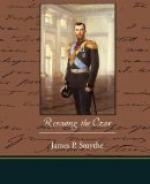With all my running around about the town I must confess I did not notice any movement; I always thought that the reason of the unrest—was the shortage of food, and a little provocation, to put Stuermer in a disagreeable position. The realization of the serious danger approaching all of us came to me only when the police fired on the mob on the Nevsky and the first real clash took place. I happened to cross the Liteinyi near Basseinaya Street, when I heard for the first time in my life the whistling of bullets and the peculiar drumming of the machine guns. I felt weak in the knees and around the waist and had to stand in a porte-cochere for a while. It was only for a few moments, and I felt ashamed of this disgusting feeling of fear. A crowd of cooks, or maids, passed near me shouting and screaming for help; they had disgustingly lost their self-control. I reached home in a hurry and found Maroossia pale and frightened. I had to tell her not to show her nose in the streets. Then Mikhalovsky called me up and asked how did I like the revolution. He did not like it: his cook had been shot in the knee; a very moderate cook, in fact.
2.
Committees, everywhere committees! Everywhere suspicions! No more cheerful faces! Permanent meetings of the new elements! Much conversation! Greetings! Wishes of prosperous free life! Hopes of the Allies that we will continue the war!
All this still characterizes our poor country.
Today—for the first time in my life (it is only the beginning!) I saw a real communist alive. He was a man of rather short size and dark complexion, if such could be detected under his greasy cheeks. He wore a small beard twisted at the end in a tin hook. His ears—transparent and pale—were unproportionately big. I stopped near the Elisseiev store to buy score cards for this evening’s bridge, when a little group of men—civilians and soldiers—gathered near the communist. The usual crowd of nowadays loafers,—shabby looking, discussing something, casting around looks full of hostility, hatred and superiority. A boy brought a chair from a cigar counter, and the communist stepped on it, and started his talk. “Tovarishshi,” he said, “the time has come."... They all applauded, though nobody knew what was going to be next, and the speaker could even have been a reactionary.
“This is he,” shouted a sailor to me; a big chap with hair falling off of his cap.
“Who is he?” I questioned.
“You, burjooi,” a soldier said to me, “no wonder you do not know him. This is Comrade Trotzky. He comes from America. You had better move on or I’ll tell who you are,”—he continued staring at me very resolutely, and spat on the sidewalk right near my foot.
I moved on. What people!
I crossed Nevsky and stood on the other side. From there I could not hear Comrade Trotzky, but studied his movements and gesticulation, his manner of scratching his nose, of quickly turning his head in a derby, and the nervous shrugging of his shoulders. The mob applauded him after every phrase, making his speech a series of separate sentences and thus giving him the advantage of thinking of most radical ideas, while awaiting for the listeners to finish the applause.




